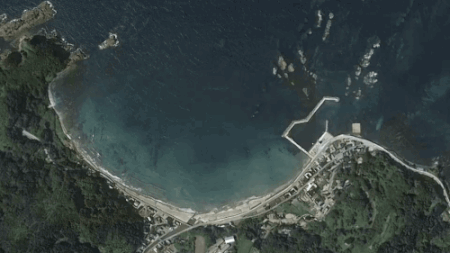Japan's coastline moved over 800 feet after the devastating Jan 1. earthquake
Satellite images captured striking changes in the coastline of Japan's Noto Peninsula following a massive earthquake on New Year's Day.

Satellite images captured striking changes in the coastline of Japan's Noto Peninsula following a massive earthquake on New Year's Day.
A 7.6 magnitude earthquake struck Japan on Jan. 1 around 2:10 a.m. EST (0710 GMT, or 4:10 p.m. local time in Japan), prompting orders for residents to evacuate affected coastal areas that experienced significant uplift. Satellite imagery of the area before and after the quake shows that the intense uplift extended the coastline by up to 820 feet (250 meters), which is greater than the length of two American football fields.
Images of Japan's Noto Peninsula shared on X (formerly Twitter) by Nahel Belgherze show coastal areas where the seafloor has risen above the water, creating newly exposed beaches. The photos capture the coastline changes after the earthquake and tsunami had already subsided, leaving some ports completely dry and inaccessible to boats.
The earthquake that struck Japan’s Noto peninsula on Monday was so strong that the coastline has moved up to 250 meters offshore due to significant land uplift. pic.twitter.com/XpxBMLRTUUJanuary 4, 2024
"During a field investigation along the northwest coast of the Noto Peninsula, we found evidence at 10 locations, from Kaiso to Akasaki sites, of coseismic coastal uplift related to the Noto Peninsula Earthquake (M7.6)," researchers with the Earthquake Research Institute at the University of Tokyo said in a statement on Jan. 4.
Related: Deadly swarm of earthquakes in Japan caused by magma moving through extinct volcano
"The pattern of estimated coseismic coastal uplift appears to be decreasing southward from Kaiso to Akasaki," they added.
The area near Akasaki port also experienced nearly 14-foot-high (4.2 meters) tsunamis, according to the university's field investigations that revealed water stains on building walls.
Sign up for the Live Science daily newsletter now
Get the world’s most fascinating discoveries delivered straight to your inbox.
The Japan Aerospace Exploration Agency's (JAXA) Advanced Land Observing Satellite-2 (ALOS-2) also captured the coastal uplift caused by the earthquake. Satellite images compare the coastline from June 2023 to Jan. 2, showing how the shoreline shifted seaward in multiple areas, including Nafune port, Wajima city and Minazuki bay, according to a statement from the Geospatial Information Authority of Japan.
While the satellite images capture significant changes following the Jan. 1 earthquake, investigations along the coast are still ongoing, according to the statement.
Originally posted on Space.com.









